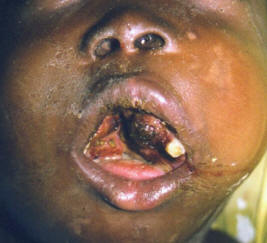got its family name (herpesviridae) from the Greek word 'herpein' which means to creep. Because of the virus's tendency to cause latent infections and sometimes illnesses that can reoccur.
was discovered by scientists with the last names of Epstein and Barr. The two British scientists first found the virus in the white blood cells of patients with rare cancers in Africa, usually attacking the lymph system.
is associated with Burkitt's lymphoma, a rare form of cancer found in the lymph system. The cancer is primarily found in children living in the warm lowlands of Africa. The B cells (white blood cells) are probably infected with a different illness first and then infection of the Epstein-Barr virus causes the cancer. One fifth of the non-African Burkitt type tumors are also associated with EBV. Other types of lymphomas are associated with Epstein-Barr virus, but they are generally found in immune compromised individuals or AIDS patients.
is
also interlinked with nasopharyngeal cancer in Asia. Rarely do
cancers form from the Epstein-Barr virus in the United States even
though eighty percent of the population will become infected during
their lifetime. Also, EBV has been linked to the formation of
rheumatoid arthritis in genetically predisposed people.
might soon be stoppable! Research scientists are currently testing primates (not humans yet) with a new vaccine that uses recombinant DNA to stimulate antibody responses by your immune system! This would only help individuals who have not yet been introduced to Mono however.
causes chronic EBV syndrome. This disease is Infectious Mononucleosis, but it can last for years! Full blown symptoms can be constant or intermittent for many years after acquiring the virus.
may induce neurological problems and diseases such as meningitis, encephalitis, and Guillain-Barrè syndrome, which is a disease where your immune system begins attacking your peripheral nervous system.
can cause Oral Hairy Leukoplakia. Leukoplakia are lesions which occur in the mouth or on the tongue and are associated with the EB virus. These lesions are more common in immune compromised individuals, such as HIV patients.
can be fatal! Yes, although EBV is generally benign there are cases where individuals are very sensitive to the virus. Duncan Disease or X linked Lymphoproliferative Syndrome, is inherited on the X chromosome during conception and heavily weakens a person's immune system. If an individual with this syndrome should contract EBV the response is severe and in some cases fatal. Abnormally low antibodies in the blood, problems with lymphoid tissues, hepatitis and death are symptoms of this disorder. Symptoms of the disease generally show up at ages six months through ten years of old.
For more helpful links and reference information click here!

